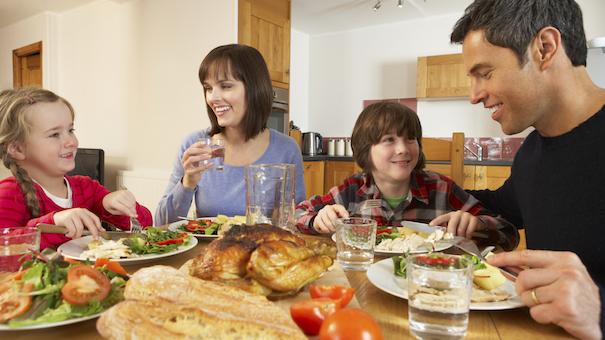By Heather White, Community Health Improvement Coordinator, Columbia Pacific Coordinated Care Organization
We all know that nutrition is incredibly important, especially for growing children. But how often do we think past the content of the meals we make our children, and think about the environments we serve those meals in? In all the big things we do for our kids: teaching them how to be a healthy adult, getting them through life’s big milestones and hurdles, and providing them their basic needs, the “little things” actually make a huge impact on who our kids turn out to be.
Research is clear across the board: Family mealtime is important. Having a consistent, supportive family mealtime can drastically reduce a child’s risk of substance use disorders, depression, suicide or suicidal thinking, obesity, and more. They can set our children up to have higher self-esteem and be more successful not only in school, but in their ability to form healthy relationships with family, friends, and colleagues. Not much of the research out there suggests that there’s any tricky magic formula to logistics: it doesn’t seem that it has to take place every night or for a specific length of time, but sitting down away from a TV to eat for 3 or more nights per week can help us build strong and lasting connections within our families. The food, the habits, the place, and more are up to us.
Family mealtimes can come in packages as diverse as our families, but some of the headaches we face may be very similar. Some of us may feel guilty for not having family mealtimes “often enough” because we are busy. Others may dread family meals because we anticipate arguments with our teens, or struggles with our toddlers over how much to eat, or because they remind us of the struggles we had with our families as children. Mealtimes can be a source of joy for you and your family, and can provide opportunities for your child to learn and grow in a safe place.
Charlie Slaughter, MPH, RD writes in his book Hungry for Love: Creating a Mealtime Environment That Builds Connection, Life Skills, and Eating Capabilities writes that it is never too late to try something new. Mr. Slaughter writes about the importance of healthy attachment and how mealtimes can be a great place to start, because mealtimes are about feeding our children (and receiving) four vital things: love, care, connection, and food. He argues that rather than focusing on the food as the most important thing, if we focus on allowing our children to make decisions about how much they eat of what you offer, having meaningful conversations, and giving and receiving love even when we tell each other “no” to foods or to behaviors that many things about parenting outside mealtime can become more joyful as well.
If you’d like to learn more about strategies for healthy mealtimes and other “small things” we can do to help our children grow, Mr. Slaughter will be giving a full day training at Tillamook Bay Community College from 9:30am-4:30pm on October 5th. It is open to parents as well as anyone who works with children. RSVP here: https://cosp_tillamook.eventbrite.com

